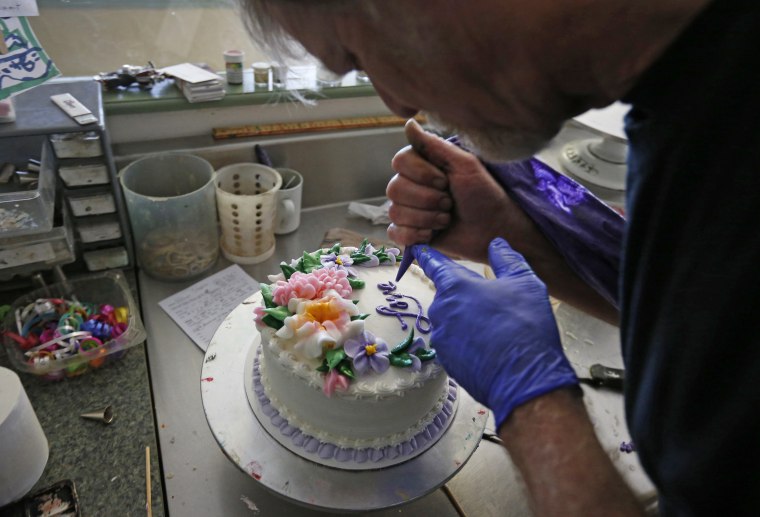For the second time in less than three months, the Department of Justice (DOJ) has submitted an amicus brief that puts it at odds with supporters of LGBTQ civil rights. This time, the department's brief was submitted to the U.S. Supreme Court.
Masterpiece Cakeshop, Ltd. v. Colorado Civil Rights Commission involves Christian baker Jack Phillips, who refused — due to his religious beliefs — to make a wedding cake for same-sex couple David Mullins and Charlie Craig.

Lower courts sided with the couple, stating that Philips' refusal violated Colorado’s non-discrimination law (Colorado is one of 21 states that prohibit discrimination on the basis of sexual orientation). However, Phillips appealed these rulings to the Supreme Court, which is scheduled to hear the case this fall.
“Forcing Phillips to create expression for and participate in a ceremony that violates his sincerely held religious beliefs invades his First Amendment rights," Acting Solicitor General Jeffrey B. Wall, who authored the brief along with the DOJ's legal team, wrote.
Last month, the DOJ submitted another amicus brief in the case of Zarda v. Altitude Express. There, the DOJ sided with the defendant to argue that Title VII of the Civil Rights Act does not entitle lesbians, gays and bisexuals to workplace non-discrimination protections.
“License to Discriminate”
Some advocates are calling the DOJ’s position on Masterpiece Cakeshop, Ltd. v. Colorado Civil Rights Commission a “license to discriminate” and citing a pattern of anti-LGBTQ actions by the Trump administration.
"Once again, the Trump-Pence Administration has taken direct aim at our nation’s progress on LGBTQ equality, this time urging the Supreme Court to grant a potentially sweeping license to discriminate against same-sex couples," Sarah Warbelow, legal director for LGBTQ advocacy organization Human Rights Campaign, said in a statement.
Related: Record Percentage of Americans Support Gay Marriage, Poll Finds
Louise Melling, deputy legal director of the American Civil Liberties Union, who is representing Mullins and Craig, agreed.
“This Justice Department has already made its hostility to the rights of LGBT people and so many others crystal clear," Melling said. "But this brief was shocking, even for this administration. What the Trump Administration is advocating for is nothing short of a constitutional right to discriminate."
Melling added, however, that she and her team are "confident that the Supreme Court will rule on the side of equal rights just as the lower courts have."
No “Ordinary Baked Good"
According to Anthony Kreis, a law professor specializing in LGBTQ rights, the DOJ's brief argues “the right to free expression trumps the right to equal access in this particular public accommodation.” This, he explained, is what makes the submission particularly troublesome.
“The thrust of the argument is that cakes — wedding cakes — are inherently expressive items,” he said. “Because they are so inextricably linked to the expressive rights of the baker as an artist, there is a First Amendment right to decline service.”
“It’s temping to fall for this as a very narrow, minor exception to the general rule ... but it doesn’t make sense," Kreis added. He said the idea that cakes are somehow special is not supported by any general principle. So by this logic, he noted, “a vendor could claim anything is expressive it they wanted to.”
Therein lies the problem for LGBTQ advocates, Kreis continued: The DOJ’s position “opens up a hole in anti-discrimination law with no foreseeable end in sight."
Religious Exemptions "Minefield"
This worry echoes those expressed by Supreme Court Justice Ruth Bader Ginsburg in the 2014 Burwell v. Hobby Lobby Stores case, where she warned of the “minefield” that granting religious exemptions to businesses would open up.
In that case, the Supreme Court sided with Hobby Lobby, a for-profit company that did not want to pay for employees' contraception coverage through the Affordable Care Act on the grounds that it violated the owners’ religious convictions.
But even in the Hobby Lobby case, Kreis said, “Justice Alito’s [majority] decision discussed how religiously motivated animus can’t trump non-discrimination laws on the basis of race, for example.” The DOJ’s brief in the Masterpiece Cakeshop case, Kreis added, recognizes this and “notes that free expression claims like the baker’s wouldn’t survive the state’s compelling interest to eradicate racial discrimination."
Related: Justice Department Files Brief Rejecting LGBTQ Workplace Protections
As such, the brief attempts to differentiate between types of discrimination, stating that the government has a compelling interest in eradicating racism but not discrimination on the basis of sexual orientation.
For Kreis, while there are certainly “large differences in history” between racial discrimination and sexual orientation discrimination, the DOJ’s distinction here is “exceptionally offensive,” because “implicit in the argument is that sexual orientation is a choice.”
The brief also lifts language from the 2015 Obergefell v. Hodges ruling, which legalized same-sex marriage in all 50 states, to weaken the claim that discrimination on the basis of sexual orientation is equally prohibited under the law. The ruling states that opposition to same-sex marriage is a view held in “good faith by reasonable and sincere people.”
However, Kreis said it is one thing for individuals to hold religious views, belong to religious institutions and proselytize — and another to deny public services on the basis of religious beliefs. “At the end of the day, it's a commercial transaction with the ultimate aim of making a profit,“ he said.
“No one who goes to a business expects to be harmed, and there are many communities where there may only one or two bakers, and if they can deny the service they will not only suffer indignity but be shut of out the market,” he added. It comes down to “who is allowed to participate in the public square.”
With this brief, Kreis said, the DOJ is “going against the grain of pubic opinion and going against the increasing pro-LGBTQ jurisprudential tide. They see this as their moment to stand athwart of history and stop the LGBTQ rights movement. It's a full on assault on LGBTQ rights across the board.”